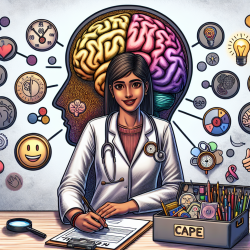The field of mental health is constantly evolving, with new research providing valuable insights into the detection and management of psychotic disorders. One such advancement is the study on the Community Assessment of Psychic Experiences (CAPE), which offers a promising tool for practitioners aiming to enhance their diagnostic capabilities.
The Importance of Early Detection
Early detection of psychotic disorders is crucial for effective intervention and management. The CAPE serves as a self-report measure designed to identify individuals who may be at risk of developing a psychotic disorder. However, determining an optimal cut-off score for this tool has been a challenge until now.
Research Findings
A recent study published in the International Journal of Methods in Psychiatric Research has shed light on this issue. The research involved a case-control sample from the Genetic Risk and Outcome of Psychosis Project, examining 27 possible cut-off scores using receiver operating curve analyses. The findings revealed that a cut-off score of >1.75 on the weighted severity positive symptom dimension was most effective in detecting individuals with a psychotic disorder.
- Sensitivity: 75%
- Specificity: 88%
- Area under the curve: 0.88
- Diagnostic odds ratio: 22.69
This optimal cut-off score correctly identified 80% of the sample as either cases or controls, providing practitioners with a reliable screening tool to aid in early diagnosis.
Implications for Practitioners
The implications of these findings are significant for mental health practitioners. By incorporating the CAPE with its newly established cut-off score into their practice, professionals can improve their ability to screen for potential psychotic disorders effectively. This enables timely intervention, which is critical in managing symptoms and improving patient outcomes.
Encouraging Further Research
The study also highlights the importance of ongoing research in refining diagnostic tools. Practitioners are encouraged to stay informed about advancements in mental health assessments and consider participating in research initiatives that contribute to this evolving field.










